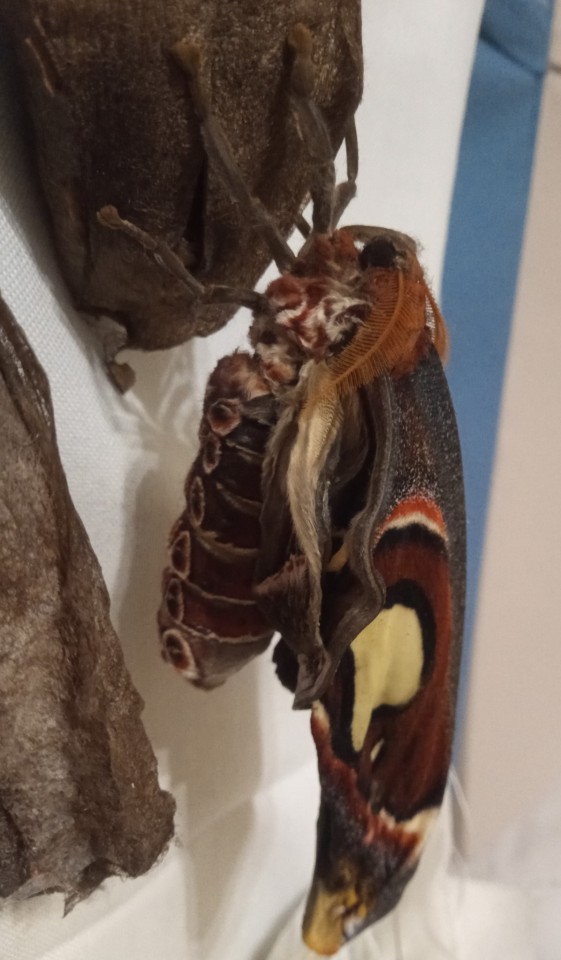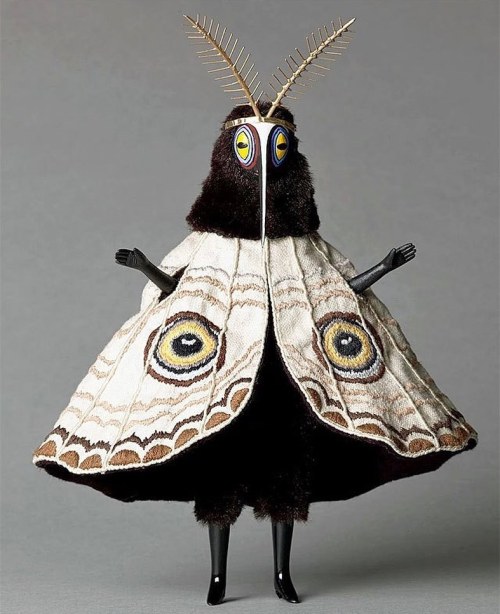My Last Two Atlas Moths Have Emerged From Their Cocoons. They Are Beautiful And Absolutely Fascinating.
My last two atlas moths have emerged from their cocoons. They are beautiful and absolutely fascinating.





Can you see the snake head markings on the tip of each forewing? They are there to deter potential predators, which I think is pretty neat.
They are absolutely gorgeous, and I am so glad that they have all hatched safely. Unfortunately, I think these two are both female so it looks like I won't be getting any fertile eggs.
One damaged it's hind wing a little when it flew into one of my orchids. It is the only one that has shown any interest in flying and has been having short (approximately 2 min) flights around my room every evening. Finding a new place to lay eggs each time.
More Posts from Pictures-and-things-321 and Others




Some after work Instagram browsing brought up an unexpected gem today as it randomly decided to show me some automatons.
I haven't seen any since childhood, where I vaguely recall them featuring on quirky supernatural or spooky shows as creepy curiosities from time to time.
I hadn't realised that they were still made or indeed that they could be made into such beautiful creations. With serenely swimming whales, cantering horses and fluttering birds & insects.
I decided to see if I could make a basic one using bits and bobs from my room. This ended up including black card, scissors, a bamboo skewer from one of my orchids, wire and wire clippers, a thin cylindrical ice cream stick that I saved from a kulfi, and hot glue and my glue gun.
It took a bit of time to wrap my head around the (admittedly very basic) mechanics and the end result is liable to come apart at the seams if I so much as think about turning the mechanism too vigorously. But I am happy with my first attempt.
If I can figure out how to make a less slap dash mechanism then I might make a realistically painted deaths head hawk moth automaton. I am rearing some caterpillars of this species so I am ever so slightly obsessed with them at the moment. You can see the caterpillars at the top of this post and I don't think I am alone in thinking they are absolutely gorgeous little buggers.

Backgrounds and geographical structures are things I, currently can't, but would really like to be able to draw/depict. and these are rendered so beautifully that I am saving it for inspirational purposes





Art by Gui Yuan










I needed to find a relatively inexpensive horticulturaly adjacent activity for little kids. It needs to go alongside a plant sale, face painting and other horticulture and animal care related activities that will be taking place at an open day at work. So after dinner I cracked out my art supplies and had a bit of a play about.
I was trying to do some pastel rubbings, of bark and leaves, but then I whacked out my printmaking bits and bobs to see what they looked like when printed and I decided to go with that. I've since looked online and there are some beautiful examples of leaves being used in printmaking.
If you're doing it with little kiddy-winks then I would suggest using sturdy leaves that aren't too waxy. Really young, tender leaves will work but they tear easily and they get a bit floppy. You can apply ink with a roller to the top or bottom surface off the leaf though the bottom side usually gives better impressions of the veins. Once your leaf (or leaves) are inked up, place them on a scrap piece of paper (inked side up) and then put a piece of paper over the top. You then want to rub the back of the paper with a spoon or barren until the ink has transferred. Then you can peel away the paper and put it somewhere to dry.
2,300-Year-Old Plush Bird from the Altai Mountains of Siberia, c.400-300 BCE: this figure was crafted with a felt body and reindeer-fur stuffing, all of which remains intact

This plush bird was sealed within the frozen barrows of Pazyryk, Siberia, for more than two millennia, where a unique microclimate enabled it to be preserved. The permafrost ice lense formation that runs below the barrows provided an insulating layer, preventing the soil from heating during the summer and allowing it to quickly freeze during the winter; these conditions produced a separate microclimate within the stone walls of the barrows themselves, thereby aiding in the preservation of the artifacts inside.
This is just one of the many well-preserved artifacts that have been found at Pazyryk. These artifacts are attributed to the Scythian/Altaic cultures.
Currently housed at the Hermitage Museum.
If you can access this on Netflix please, please watch Scavengers Reign. I can't describe how amazing it is. Stunning visuals, immaculate and fun world building with a spectacular array of alien fauna and flora, beautiful character driven storytelling.
I am going to start rewatching it as I can't get it out of my head. I really need a second series. Please watch this.
It can be a bit gory in places (but most of it isn't) and does deal with some heavy topics but these were handled in such a careful way so please don't let it put you off if you think you can handle it.





Scavengers Reign 1.02 "The Storm"







Some wonderfully vibrant rainbow corn that we grew at work. They are like little gems and almost look photoshopped.

I wanted to enter an embroidery competition that was run by Domestika. And this is what I ended up coming up with. It is a lichen themed French barrett hair clip.


Prior to planning and making my embroidery I went on some walks and took some photos for inspiration.







I really love lichen it's such a strange thing. The physical structure of lichen is a fungi that clings to tree branches, rocks, and other solid surfaces. The fungi provides a home for a colony of tiny algae or cyanobacteria. The algae or cyanobacteria photosynthesize producing sugars and other molecules that they share with the fungi. These are what give the lichen its colours. So lichen isn't really one thing. It is a living collaboration of two completely unrelated organisms. It can survive desiccation and bounces right back with a little rain.
It looks a bit like coral and can be used to indicate air quality. Overall a fascinating and splendid amalgam.
I attended an invertebrate show with my friends a few months back and ended up picking up four atlas moth cocoons towards the end.
I wasn't sure if they would emerge successfully but yesterday I found the first one sitting on my wardrobe.



Isn't it beautiful!

If the others hatch out in time then I will hopefully have some fertile eggs. I really want to see the whole life cycle of these amazing things.

Moth Dress by Cat Johnson Photo credit: Christina Solomons
Some absolutely gorgeous illustrations. The first one is my absolute fave (dragons are wonderful) Happy birthday btw.





Hey sprouts! 🌱
I recently had a birthday and I would be grateful for a reblog of my favorite works at the moment! :9
-
 falconre-re liked this · 2 years ago
falconre-re liked this · 2 years ago -
 pizzolisnacks liked this · 2 years ago
pizzolisnacks liked this · 2 years ago -
 isisanea liked this · 2 years ago
isisanea liked this · 2 years ago -
 sweetcreamdreamgirl liked this · 2 years ago
sweetcreamdreamgirl liked this · 2 years ago -
 shriveledradish liked this · 2 years ago
shriveledradish liked this · 2 years ago -
 fuzzyspiderpawz liked this · 2 years ago
fuzzyspiderpawz liked this · 2 years ago -
 worldtherewithin liked this · 2 years ago
worldtherewithin liked this · 2 years ago -
 cloud-of-roses liked this · 2 years ago
cloud-of-roses liked this · 2 years ago -
 moon-rabbits liked this · 2 years ago
moon-rabbits liked this · 2 years ago -
 eclypses-hyperfixations reblogged this · 2 years ago
eclypses-hyperfixations reblogged this · 2 years ago -
 shoobdoob reblogged this · 2 years ago
shoobdoob reblogged this · 2 years ago -
 shoobdoob liked this · 2 years ago
shoobdoob liked this · 2 years ago -
 riotonstuff liked this · 2 years ago
riotonstuff liked this · 2 years ago -
 mad-unit-alive liked this · 2 years ago
mad-unit-alive liked this · 2 years ago -
 static-ink55 liked this · 2 years ago
static-ink55 liked this · 2 years ago -
 deadbeatmoth liked this · 2 years ago
deadbeatmoth liked this · 2 years ago -
 vanlikesblog liked this · 2 years ago
vanlikesblog liked this · 2 years ago -
 crystalinenergy liked this · 2 years ago
crystalinenergy liked this · 2 years ago -
 fineillcookitmyself liked this · 2 years ago
fineillcookitmyself liked this · 2 years ago -
 beesforknees liked this · 2 years ago
beesforknees liked this · 2 years ago -
 mopperbot liked this · 2 years ago
mopperbot liked this · 2 years ago -
 lakepetals liked this · 2 years ago
lakepetals liked this · 2 years ago -
 supersquidlit liked this · 2 years ago
supersquidlit liked this · 2 years ago -
 lion6030 liked this · 2 years ago
lion6030 liked this · 2 years ago -
 faemon reblogged this · 2 years ago
faemon reblogged this · 2 years ago -
 faemon liked this · 2 years ago
faemon liked this · 2 years ago -
 characteroulette liked this · 2 years ago
characteroulette liked this · 2 years ago -
 gothgaymoth reblogged this · 2 years ago
gothgaymoth reblogged this · 2 years ago -
 yummyworms liked this · 2 years ago
yummyworms liked this · 2 years ago -
 astulencita34 liked this · 2 years ago
astulencita34 liked this · 2 years ago -
 gspaepro liked this · 2 years ago
gspaepro liked this · 2 years ago -
 bi-julius-caesar liked this · 2 years ago
bi-julius-caesar liked this · 2 years ago -
 creepyboy02 liked this · 2 years ago
creepyboy02 liked this · 2 years ago -
 dixieandherbabies liked this · 2 years ago
dixieandherbabies liked this · 2 years ago -
 fleur-avatar liked this · 2 years ago
fleur-avatar liked this · 2 years ago -
 cottageskeletonlass reblogged this · 2 years ago
cottageskeletonlass reblogged this · 2 years ago -
 cottageskeletonlass liked this · 2 years ago
cottageskeletonlass liked this · 2 years ago -
 hairspraywhore liked this · 2 years ago
hairspraywhore liked this · 2 years ago

Hello, I love plants, animals (particularly insects), art, craft, animation and other random stuff like creature design and sci-fi. My pronouns are she/her and I am aro/ace.
29 posts